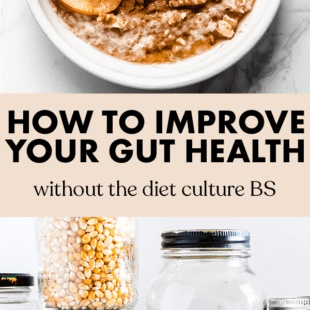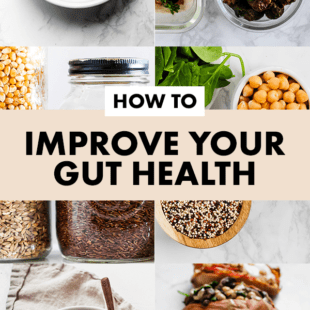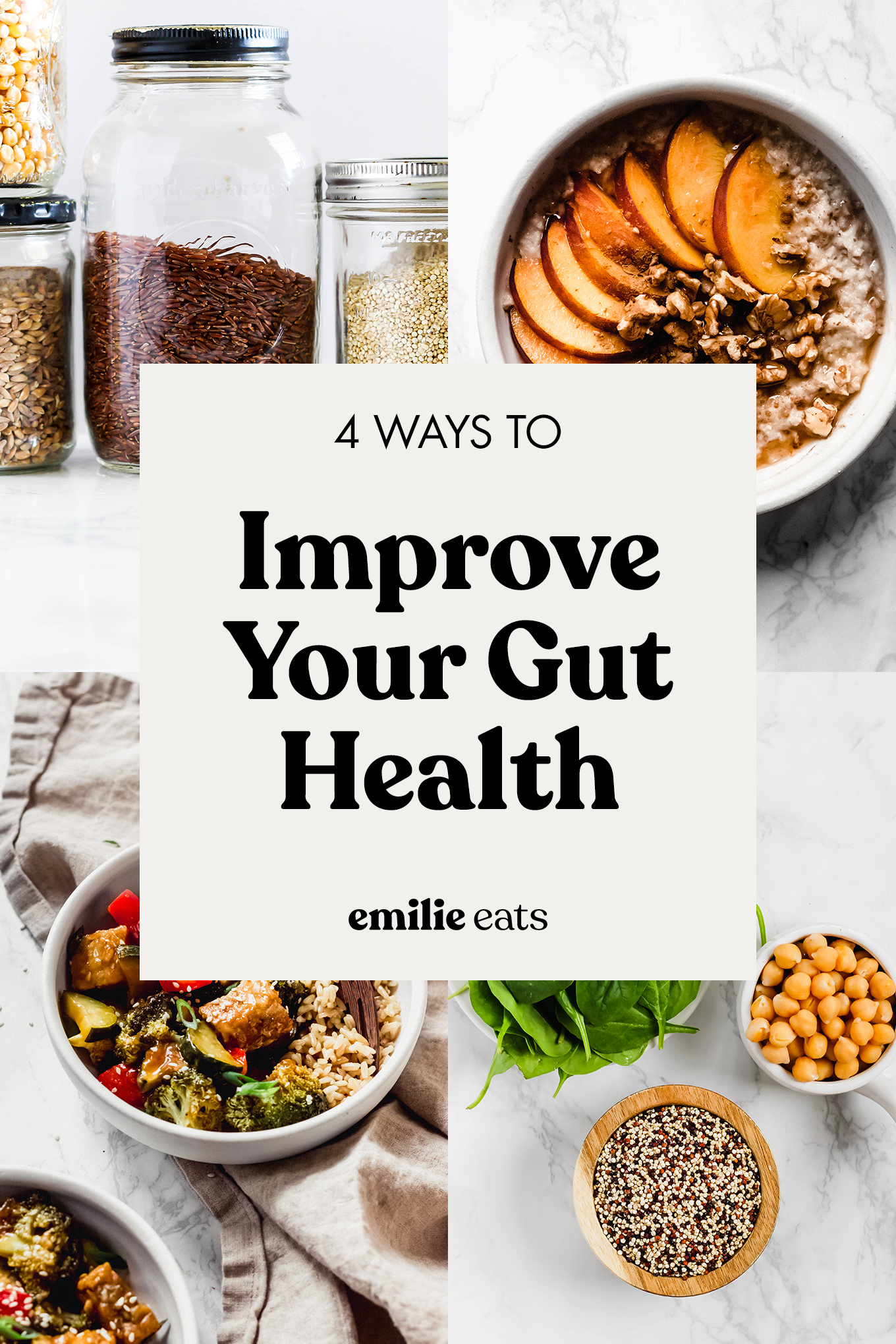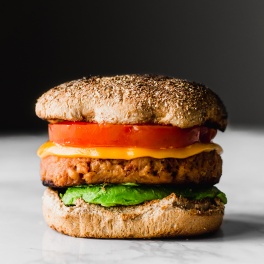Say no to fancy supplements, bogus diets, and celery juice. Here are 4 science-backed ways to improve gut health without the nonsense.
How to Improve Gut Health (Without Diet Culture BS)
It’s no news that our gut plays a huge role in our body. Gut health is linked to the immune system, heart health, and brain health, and it can even influence our mood.1 Of course, having a healthy gut can also improve the digestive system, since the gut is an important part of our absorption and proper digestion of nutrients.2
Gut microbiota (the bacteria in our gut) make up our gut microbiome, the entire community of various types of bacteria in our gut. We have both “good” and “bad” microbiota in our gut. Moreover, many gut health issues arise when the “bad” bacteria overpower the “good” bacteria. The tips in this post on how to improve gut health will help strengthen the “good” bacteria in your gut so all those microbiota can better live in balance with each other, leading to better gut health!
Our gut microbiome connects to our brain in what is called the gut-brain axis. This axis allows the gut and the central nervous system (which includes the brain) to communicate. Have you ever been upset, stressed, or anxious, then you got a stomach ache? That’s likely the gut-brain axis! This is one reason why cultivating positive feelings, beliefs, and emotions around food is crucial to improving gut health.
Despite what fad diets have us believe, the ways in which we improve gut health do not have to be restrictive, expensive, or complicated. Read on for more about how to improve gut health, without all the diet culture BS.

1. Reduce Stress
Reducing stress can improve the integrity of the gut. Because of how the gut communicates with the brain via the gut-brain axis, stress, anxiety, depression, and other disorders may cause inflammation in the gut.3 Also, high stress levels put our bodies into “fight or flight” mode. Our ancestors may have benefited from this when they were running from tigers, but nowadays, we are inundated with stress from work, family, the world, social media, or even disordered eating. This high stress prevents our bodies from entering “rest and digest” mode.
Using healthy coping mechanisms for stress can reduce inflammation in the gut, improve the health of our gut microbiome, and possibly ease any GI distress. It can also help us to get into “rest and digest” mode when we eat.
Some coping mechanisms for stress include:
- Journaling
- Yoga
- Meditation
- Reading
- Asking for help
- Therapy
- Maintaining emotionally supportive relationships
- Medication as recommended by your doctor

2. Get Adequate Sleep
Along with managing stress, getting enough sleep is a way we can improve and maintain gut health. Lack of sleep can increase stress, which negatively influences gut health. Maintaining a consistent sleep schedule that includes enough sleep AND good-quality sleep can enhance mood, stress level, immune health, energy levels, and prevent disease.4 The Mayo Clinic recommends 7 or more hours of sleep per night for adults over age 18. 5
Some tips to getting enough sleep are:
- Turning electronics off prior to sleeping
- Winding down with a book
- Meditating
- Setting up a night time routine
- Not consuming caffeine close to bedtime
- Reducing long daytime naps
- Creating a relaxing bedroom environment
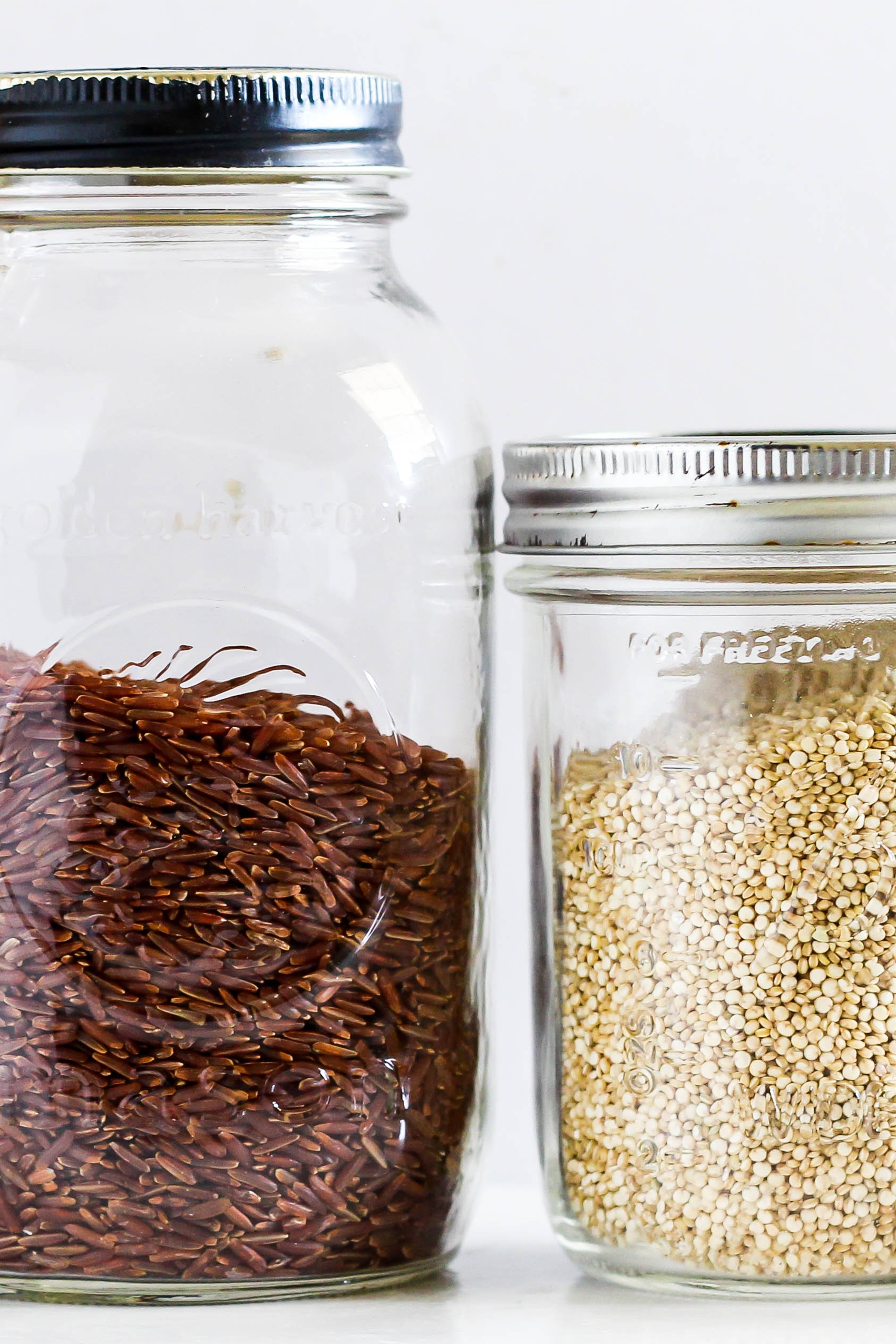
3. Eat Enough Dietary Fiber
Being able to add in different forms of dietary fiber into meals can improve gut health. Fiber feeds the bacteria in the gut, keeping it alive and thriving.
There are two different types of fiber: soluble and insoluble. Soluble fiber dissolves in water and forms a gel, which keeps us full and satisfied after a meal. It’s benefits include feeling satisfied after a meal, improving blood glucose levels, and can reduce LDL (the “bad” cholesterol in the body. Insoluble fiber does not dissolve in water, but rather adds bulk to the food passing through. Insoluble fiber helps prevent constipation, and helps to keep us full after a meal. Another benefit of insoluble fiber is lowering the risk of diverticular disease. (Note: if you have certain digestive conditions, your doctor or dietitian may recommend lower amounts of fiber to prevent GI symptoms.)
Include a variety of vegetables, whole grains, and fruit with the skin (the part with the most fiber) are all ways to include fiber. Examples of fiber-rich foods are:
- Whole grains, like brown rice, quinoa, corn, and oats
- Beans
- Lentils
- Fruits
- Vegetables
- High-fiber cereals
- Chia seeds
(Read more about fiber and how to eat more of it!)

4. Include Probiotics and Prebiotics in Your Diet
Fermented foods contain probiotics (“good” bacteria). These may beneficially impact gut health. Examples of probiotic rich foods are:
- Yogurt
- Kimchi
- Sauerkraut
- Kombucha
- Kefir
- Miso
- Sourdough bread
- Tempeh
Also, there is no shortage of probiotic supplements on the market. Consulting with a doctor or dietitian is the best way to ensure that you’re taking a probiotic supplement suited for you. Different strains of bacteria have different effects on the gut, and you want to take something that will actually benefit you.
While probiotics are the actual live bacteria, prebiotics are food for these bacteria. Just like us, gut bacteria need food to survive. We can feed the “good” bacteria with high-fiber plant foods. We can’t actually digest fiber, but gut bacteria can! Prebiotic food sources are:
- Oats
- Berries
- Legumes
- Beans
- Bananas
- Asparagus
- Garlic
- Onions
The information on this site does not serve as professional medical advice, diagnosis, or treatment. The information given is for educational purposes only. Please consult a doctor or dietitian before making diet or exercise changes.
- https://www.hsph.harvard.edu/nutritionsource/stress-and-health/
- https://www.health.harvard.edu/topics/digestive-health
- https://pubmed.ncbi.nlm.nih.gov/29024170/
- https://www.mayoclinic.org/diseases-conditions/insomnia/expert-answers/lack-of-sleep/faq-20057757
- https://www.mayoclinic.org/healthy-lifestyle/adult-health/expert-answers/how-many-hours-of-sleep-are-enough/faq-20057898

